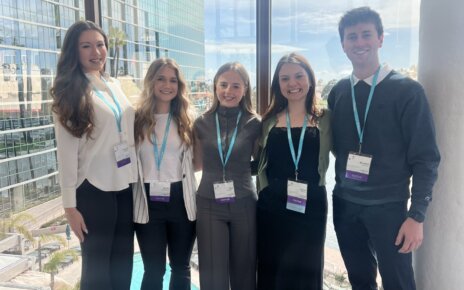Monmouth University Youth Activists Group (YAG) and The Sociology Club held an event promoting Mindfulness for Halloween, where an open discussion on the topic of cultural appropriation was discussed.
The event was Oct. 25 at the Rebecca Stafford Student Center and featured free candy, face painting, Halloween music, and educational literature.
YAG shared mindful tips for students to consider when planning their Halloween costumes by opening a discussion on cultural appropriation as well as providing supporting educational literature. They also incorporated environmental awareness into the event by serving the candy in bulk and encouraging ‘Do it Yourself’ costumes and recycling at parties.
Dr. Corey Wrenn, Director of the Gender Studies program, visited the event and felt that it was “fun and professional.” Wrenn defines cultural appropriation as, “a dominant cultural group picking and choosing parts of a subordinated cultural group for their own use.” Wrenn suggests, “The reason this is a problem is because it often objectifies and glosses over ongoing and active oppression of the groups being appropriated.”
YAG member and lead organizer of the event, Emily Keane, said, “Cultural appropriation is a very controversial and touchy subject for many. I believe that it’s really important for those who are uneducated about cultural appropriation to learn more about it,”
“[Our goal was] to help spread an overall better understanding of how to recognize when someone is appropriating another’s culture” she continued.
Keane said that it is important to have this event before Halloween because, “Though cultural appropriation can be seen all year round; it’s especially relevant during Halloween. Having your whole society of origin be used as a cheap Halloween costume is extremely insulting and degrading. It minimizes the people of that culture, and reduces their treasured traditions and values to the price tag you see hanging next to the costume.”
Marco Palladino, a senior political science student said, “The Youth Activists Group has members that have varying opinions on this topic and wanted to be understanding to all members of Monmouth’s community in order to have an intellectual conversation about the topic.”
One member of the Youth Activists, Davina Matadin, a sophomore computer science student said, “I personally find it difficult to side on cultural appropriation. Being an Indian student, I love when I see others embracing my culture. Although, I feel there is a line that should not be crossed. As long as people are not making offensive comments about the culture, I believe that recognizing differences is all just fun.”
Another key organizer of this event, Gowri Jagadeesh, a freshman health studies student said, “Cultural appropriation awareness is something I am very passionate about because the consequences are very real. There are a lot of stereotypes that become reinforced when people come dressed in a way that misrepresents a culture. The problem with this is that a lot of people of color begin to start internalizing these stereotypes into themselves and have a hard time being able to see themselves outside of their stereotypes, which can have a terrible effect on the mental health and success of a lot of people of color.”
Jagadeesh continued, “In addition to that, a lot of times the clothes or significant object that is being appropriated is only praised in that context. It’s not fair, for example, that I have gotten called a ‘dothead’ for wearing a bindi, which is a part of my culture, but other people wearing bindis at Coachella get praised for being fashionable by wearing a bindi. It’s not fair that a black woman would get called ‘ghetto’ or ‘hood rat’ for wearing her hair in cornrows but another woman outside of that culture would get called ‘edgy’ for doing the same thing. Different parts of culture are not meant to be sold as a product and worn as a trend. Culture is so much more than a fleeting fashion accessory.”
Dr. Stuart Rosenberg, Department Chair of Management and Decision Sciences said, “Simply stated, cultural appropriation is the use of elements from someone else’s culture. Certainly, I shouldn’t be facing an ethical dilemma if I were to prepare a meal, for example, that included another culture’s traditional dishes. When it comes to clothing, however, it gets trickier. When we’re looking at this in the context of little kids dressing up, obviously there is no negative intent. We don’t ever want to go to the other extreme and become overly guarded, but clearly being sensitive to the feelings of others is key.”
“I think it’s increasingly important for people to exercise good judgment in considering costumes that might be interpreted as disrespectful to another culture, perhaps even more so if it’s a racial or ethnic minority. We mustn’t confuse stereotyping with diversity,” Rosenberg continued.
PHOTO TAKEN by Joy Morgan




